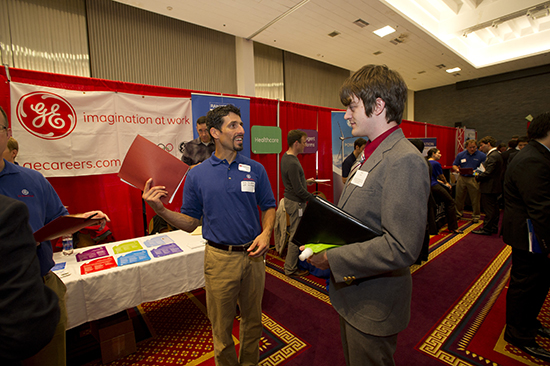Panel to Explore Faculty-Corporate Education Partnerships
Tomorrow’s event open to all faculty, staff

Bringing representatives from businesses to campus, as happened with this 2012 School of Engineering career festival, is the goal of the Educated and Employable panel. Photo by Vernon Doucette
If companies want their future employees to be gifted team workers and leaders, communicators, and analysts, why not help train those future workers while they’re still in college? BU has partnerships with several big companies interested in just that, including AT&T, GE, Phillips, and Schneider Electric.
“These companies are willing to get involved and help students develop these skills through work in the classroom or internships,” says Kathy Lynch, BU’s director of corporate relations. They’re “willing to provide access to data, challenges, scenarios, and executives to provide our students with opportunities to apply the skills that they are learning in the real world.”
They’re also willing to come to campus to talk with faculty, which they will do via a panel discussion tomorrow about making the education-employability connection clear. The event, titled Educated and Employable, cosponsored by the Office of the Provost and the Corporate Relations office, will “provide our faculty and staff an opportunity to directly network with some of our industry partners,” Lynch says. The event is open to faculty and staff at all BU schools, but requires registration.
Kenneth Freeman, the School of Management’s Allen Questrom Professor and Dean, will moderate the panel, which will comprise Raymond Han (CAS’98), managing director of global Oracle customer experience domain at the Dublin-based technology and management consulting company Accenture; Alicia Sundberg (SMG’90), senior vice president of domestic operations and data management at Fidelity Investments; David Rowatt, research director of mechanical and materials sciences at tech company Schlumberger; Mak Joshi (SMG’11), director of platform management at energy management firm Schneider Electric; and Brad Meiseles, senior vice president of product and engineering at data protection company Carbonite.
Among the topics panelists will address: what skills and knowledge do companies expect from their workers? How can working on real-world problems help BU students’ education? What are the upsides and downsides of working with companies, and what do the companies—and BU professors and programs—expect from these partnerships?
Han says his company sees such partnerships as hugely beneficial. “BU’s students have an opportunity to learn from professionals in the community while being in a safe academic environment,” he says, at the same time that Accenture “gets the opportunity to build our brand both on campus and off.” And “in terms of the skills that we look for from graduates, we are incredibly excited by BU’s focus on technical and quantitative learning through teams and interactions with industry.”
Don’t think the event is only for science and technology types: Susan Jackson plans to attend—and she teaches French.
The College of Arts & Sciences associate professor of French and senior associate dean says she’s hoping to talk with corporate leaders “whose commitment to partnerships with BU has a specific focus on thinking together about how we can help our students take their education into the world of meaningful and satisfying work.”
Freeman says the event reinforces the feedback from last year’s Business Jam, an online global discussion, spearheaded by SMG, about the future of business education that involved 4,000 businesspeople and academics. “A resounding finding from this event was the critical need for industry and academia to work more collaboratively and engage more deeply,” he says. The panel will showcase BU’s “unprecedented opportunity to better engage companies and organizations, large and small, to create meaningful learning experiences for our students and exposure for our faculty, and to increase our reach across industry.”
BU’s three-year-old Corporate Relations office arranges partnerships with companies through an ongoing series of initiatives. Many BU faculty members already collaborate with firms in class projects, internships, case studies, and research, Lynch says. For example, College of Engineering students work on projects to “design and prototype a product, electronic device, or software system,” and companies often offer feedback on the projects. And SMG students do case studies with companies, researching a particular business problem and recommending solutions that are made in a presentation to the firm’s management.
A panel on education and employability does not mean the latter trumps all other values of an education, says Lynch, and Linda Wells agrees. Wells, special advisor to the provost for student choices and transitions, says that with media attention on a degree’s value and changing workplaces, “students and their parents are perhaps more anxious and unsettled than students and parents in prior decades.”
In her past job as dean of the College of General Studies, Wells recalls telling liberal arts–wary parents, “We may be preparing your sons and daughters for work we cannot even describe right now. A liberal arts education is both an end in itself—good in itself and something that can never be taken away—and a means to an end: employability. It is not preparing students for a job in the narrow sense of the word, but for a lifetime of productive work, in the broadest sense of the term.”
The Educated and Employable panel runs from noon to 2 p.m. tomorrow, Thursday, March 19, at the Photonics Center Colloquium Room, ninth floor, 8 St. Mary’s St. The event is free and open to faculty and staff at all BU schools; lunch will be provided. Register here.
Comments & Discussion
Boston University moderates comments to facilitate an informed, substantive, civil conversation. Abusive, profane, self-promotional, misleading, incoherent or off-topic comments will be rejected. Moderators are staffed during regular business hours (EST) and can only accept comments written in English. Statistics or facts must include a citation or a link to the citation.